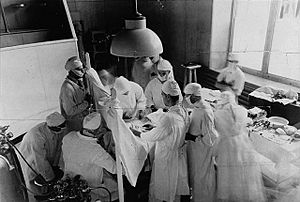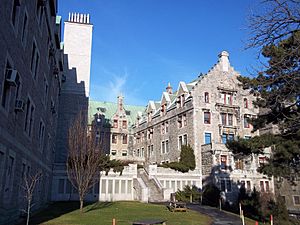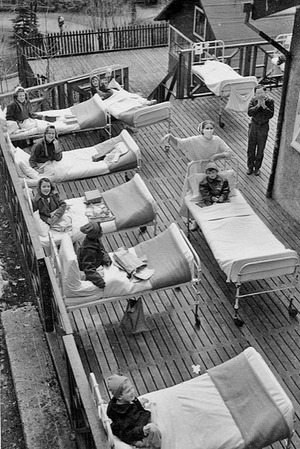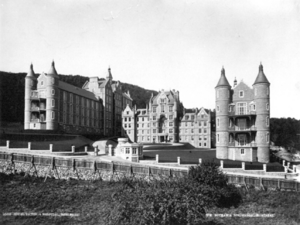Royal Victoria Hospital, Montreal facts for kids
Quick facts for kids Royal Victoria Hospital - Glen |
|
|---|---|
| McGill University Health Centre | |

McGill University Health Center's hospital complex - Glen site
|
|
| Geography | |
| Location | 1001 Decarie Boulevard, Montreal, Quebec, Canada |
| Coordinates | 45°28′19″N 73°36′10″W / 45.471851°N 73.602716°W |
| Organization | |
| Care system | Public (RAMQ) |
| Hospital type | Teaching |
| Affiliated university | McGill University Faculty of Medicine |
| Network | McGill University Health Centre |
| Services | |
| Emergency department | Yes |
| Beds | 517 |
| Speciality | General medicine, Surgery, Organ Transplantation |
| History | |
| Founded | 1893 (Legacy site) 2015 (Glen site) |
The Royal Victoria Hospital (RVH), also known as "The Royal Vic", is a hospital in Montreal, Quebec, Canada. It is a big part of the McGill University Health Centre (MUHC). This hospital works closely with McGill University.
The Royal Vic first opened in 1893. It was located on Pine Avenue, which is now called the Legacy site. In 2015, most of the hospital's operations moved to a new, modern location called the Glen site. This new site is at 1001 Décarie Boulevard. The old Pine Avenue site is now being studied for new uses, possibly by McGill University.
Contents
Hospital History

The Royal Victoria Hospital was built in 1893. It was made possible by generous gifts from two cousins, Donald Smith and George Stephen. They were Scottish immigrants who wanted to help the community.
In 1887, they gave C$1,000,000 to build a free hospital in Montreal. They also bought land on Mount Royal for C$86,000. Later, they gave another C$1,000,000 to help pay for the hospital's ongoing costs. They had one important rule: the hospital's land and buildings must always be used for healing.
The founders wanted the Royal Vic to be for "the sick and ailing without distinction of race or creed." When it opened, people said it was the "finest and most perfectly equipped hospital" in North America. It started with 150 employees, including 14 medical doctors.
Over the years, many other generous people from Montreal's English-speaking community helped the hospital. This made it famous around the world for healthcare and learning.
Medical Achievements
In 1920, the hospital became a place for medical research through the McGill University Faculty of Medicine. In 1929, Dr. Wilder Penfield started the Montreal Neurological Institute next to the hospital.
One major medical success at the Royal Victoria Hospital was the first successful kidney transplant in the Commonwealth. This happened in 1958. A team led by Dr. John Dossetor and surgeons Joe Luke and Ken MacKinnon performed it. Today, the Royal Victoria Hospital is part of the McGill University Health Centre.
During the 2020 coronavirus pandemic, the hospital helped by providing a special area. This area was used to isolate homeless people who had coronavirus disease 2019 (COVID-19) or were waiting for test results.
The Original Legacy Site
| Royal Victoria Hospital - Legacy | |
|---|---|
|
Hôpital Royal Victoria - Legacy
|
|

Original site of the Royal Victoria Hospital, now a historic site part of McGill University
|
|
| General information | |
| Type | hospital |
| Architectural style | Scottish baronial |
| Address | 687 Pine Avenue |
| Town or city | Montreal |
| Country | Canada |
| Coordinates | 45°30′30″N 73°34′53″W / 45.50826°N 73.58145°W |
| Completed | 1893 |
| Relocated | 2015 |
| Technical details | |
| Material | Montreal limestone |
| Design and construction | |
| Architect | Saxon Snell |
The Royal Victoria Hospital used to be in a large building complex at 687 Pine Avenue. This location is on the side of Mount Royal. Most hospital services moved to the new Glen site in April 2015. However, some parts, like the McGill Reproductive Centre and the Dialysis Clinic, stayed at the original site for a while.
The original hospital building was designed by a Scottish architect named Henry Saxon Snell. He was known for designing hospitals. The building is made of Montreal limestone. It has unique features like crenelated (castle-like) walls and romantic turrets. These turrets frame sunny porches at the corners of the patient wards.
Snell's design was inspired by the Scottish baronial style. From a medical point of view, his design followed ideas from Florence Nightingale. She believed in a "Pavilion Hospital" style. This meant separating patients and diseases to stop infections from spreading. The first part of the building was finished in 1893.
Over time, new sections were added to the hospital. These additions kept the same architectural style. The H pavilion, which was a home for nurses, opened in 1905. In the 1920s, the Women's and Ross Memorial pavilions were added. More expansions happened in the early 1950s. The C pavilion, which has the emergency room and birthing center, opened in 1993.
Hersey Pavilion

The Hersey Pavilion, also called the H Pavilion, was one of the first buildings in Canada built specifically for nurses to live in. It was built in 1905 on the hospital campus. The famous Montreal architects Edward & William Sutherland Maxwell designed it. In 1997, it was named a National Historic Site. This was because it played a very important role in training nurses in Canada.
Famous Doctors and Nurses
Many talented medical professionals have worked at the Royal Vic.
Notable Surgeons
- Sir Thomas Roddick: The first head surgeon of the Royal Vic.
- Edward William Archibald: Known as Canada's first neurosurgeon.
- Lt.-Colonel John McCrae: A Royal Vic doctor who wrote the famous poem In Flanders Fields.
- Norman Bethune: Developed a mobile blood-transfusion service during the Spanish Civil War.
- Wilder Penfield: Founded the Montreal Neurological Institute. He was called "the greatest living Canadian" in his time.
- Martin Henry Dawson: The first person in history to inject penicillin into a patient in 1940.
- Arthur Vineberg: Developed the 'Vineberg Procedure' at the Royal Vic in 1950.
- Kathryn Stephenson: The first female American plastic surgeon.
- John Dossetor: Helped with the first kidney transplant in both Canada and the Commonwealth in 1958.
- Balfour Mount: Considered the founder of palliative care (care for serious illnesses) in North America.
Notable Nurses
- Mabel Clint: A nurse who served during World War I in France, Belgium, and Greece.
- Helen Kendall: A nurse who was awarded the Royal Red Cross for her service during wartime.
More to Explore
- Montreal Neurological Institute
- Allan Memorial Institute
- Montreal General Hospital
 | Emma Amos |
 | Edward Mitchell Bannister |
 | Larry D. Alexander |
 | Ernie Barnes |





